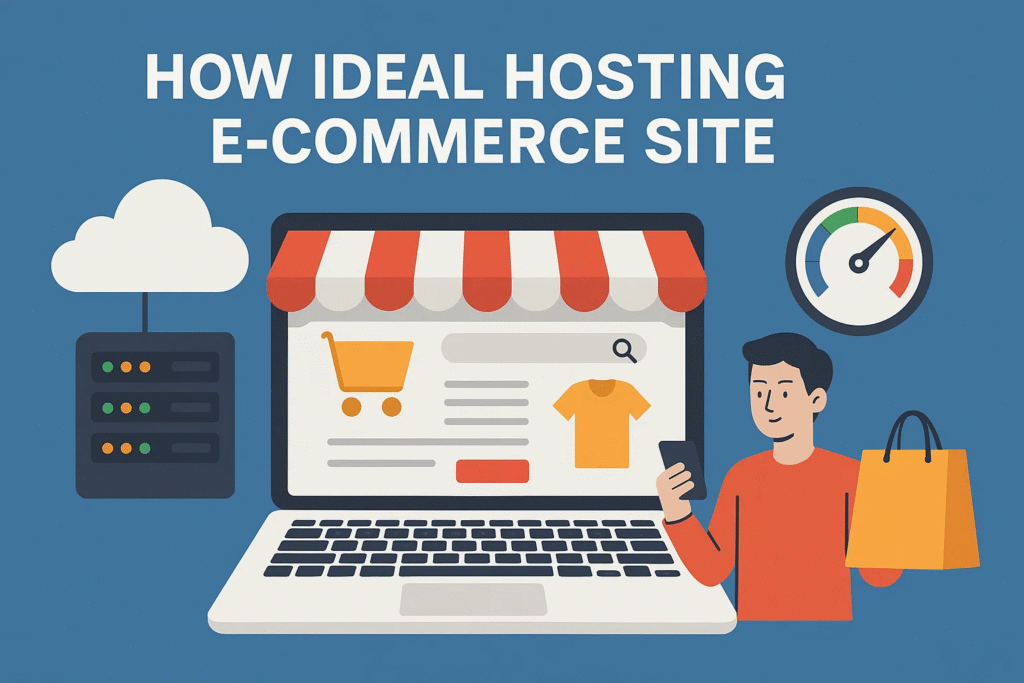Introduction
Launching an e-commerce website is exciting — but behind the sleek interface and seamless checkout experience lies the unsung hero of your online business: your web hosting. The right hosting platform ensures your website is fast, secure, and capable of handling surges in traffic. A poor choice can lead to slow load times, crashes during high sales periods, and even lost revenue.
This guide will walk you through how to choose the ideal hosting for your e-commerce site. You’ll learn about hosting types, key performance factors, security essentials, and even find a helpful comparison table to guide your decision.
1. Why Hosting Matters for E-commerce
Your hosting provider acts like the foundation of a building. Even with the most attractive storefront and high-quality products, if the foundation is weak, your store won’t thrive. For e-commerce businesses:
-
Downtime = Lost Revenue: Every minute your site is offline can mean lost sales.
-
Speed Influences Conversions: Studies show every second of delay can reduce conversion rates significantly.
-
Security is Non-Negotiable: Customer trust hinges on secure transactions and data protection.
2. Types of Hosting for E-commerce
Before choosing a hosting service, it’s crucial to understand the different hosting types available:
-
Shared Hosting: Cheapest option. Many websites share the same server resources. Not recommended for medium or large e-commerce sites due to resource limitations.
-
VPS (Virtual Private Server): Offers dedicated resources on a shared server environment. Better performance and scalability.
-
Dedicated Hosting: A server entirely devoted to your website. Ideal for large stores with heavy traffic.
-
Cloud Hosting: Flexible and scalable. Resources are distributed across multiple servers. Great for unpredictable traffic spikes.
-
Managed WordPress Hosting: Specifically optimized for WordPress-based e-commerce sites. Usually includes automatic updates, backups, and security monitoring.
3. Essential Features to Look for in E-commerce Hosting
a) Performance & Speed
-
Look for SSD storage (faster than traditional HDDs).
-
Choose hosting with built-in caching or CDN support.
-
Ensure the server is geographically close to your primary customer base.
b) Uptime Guarantee
-
A good hosting provider should offer at least 99.9% uptime.
-
Ask for transparent uptime reports or service-level agreements (SLAs).
c) Scalability
-
As your store grows, your hosting should scale effortlessly.
-
Cloud or VPS hosting usually offers the easiest scaling options.
d) Security Features
-
SSL certificates (a must for online stores).
-
Daily backups and easy restore options.
-
Firewall and malware scanning.
-
PCI-DSS compliance if you handle payments directly.
e) Support Quality
-
24/7 support through chat, phone, or email.
-
Specialized WordPress or WooCommerce support if needed.
f) Pricing & Value
-
Evaluate not just the monthly fee but renewal rates, add-ons, and hidden charges.
4. Hosting Comparison Table
| Hosting Type | Best For | Pros | Cons | Typical Price Range | Scalability | Security Level | Ease of Use |
|---|---|---|---|---|---|---|---|
| Shared Hosting | Small starter sites | Very affordable; easy to set up | Limited resources, slower performance, less secure | ₹100–₹500/month | Low | Basic SSL | Beginner-friendly |
| VPS Hosting | Growing stores | Dedicated resources; more control | Slightly higher cost; some technical skills required | ₹700–₹2,000/month | Medium-High | Customizable security | Moderate |
| Dedicated Hosting | Large high-traffic stores | Full control; excellent performance | High cost; requires server management skills | ₹5,000–₹15,000/month | High | Advanced | Advanced users |
| Cloud Hosting | Stores with variable traffic | Highly scalable; pay for what you use | Pricing can be complex | ₹1,000–₹10,000/month | Very High | Strong, flexible | Moderate |
| Managed WordPress Hosting | WooCommerce sites | Optimized for WP; includes updates and support | Usually higher price than shared hosting | ₹500–₹3,000/month | Medium | Enhanced WP security | Very easy |
5. Hosting Performance Factors That Affect E-commerce Success
Page Load Speed
Customers expect instant page loads. Choose a host offering solid-state drives, optimized server software, and CDN integrations.
Server Location
Hosting servers closer to your audience means faster load times. If your customers are in India, hosting in Mumbai or Bangalore will outperform hosting in Europe or the US.
Resource Allocation
Enough CPU, RAM, and bandwidth ensure your store can handle concurrent users without crashing.
Caching & CDN Support
Integrated caching and Content Delivery Networks (CDNs) reduce latency and improve load times globally.
6. Security Features That Protect Your Customers
Security is paramount in e-commerce hosting. Look for:
-
SSL Certificates: Mandatory for encrypting transactions.
-
Two-Factor Authentication (2FA): Adds another layer of protection to admin areas.
-
Automatic Backups: Daily backups can save you from disasters.
-
Malware Detection: Constant scanning for vulnerabilities.
-
PCI Compliance: If you process payments directly, ensure PCI-DSS compliance.
7. Scalability and Growth: Future-Proofing Your Hosting
One common mistake online retailers make is choosing a plan that fits their current needs but not their future growth. Ask yourself:
-
Will my host handle a surge of 10x traffic during festive sales?
-
Can I upgrade my plan without downtime?
-
Are there clear paths from shared to VPS to dedicated servers?
Cloud hosting and VPS plans excel in scalability. Managed hosting can also help as it often includes automated scaling options.
8. Customer Support: Your Lifeline During Crises
No matter how reliable your hosting provider, issues can occur. That’s when 24/7 support becomes invaluable. Choose a host offering:
-
Instant live chat or phone support.
-
Knowledgeable staff familiar with e-commerce platforms like WooCommerce, Magento, or Shopify.
-
Clear escalation procedures for major incidents.
9. Pricing vs. Value: Balancing Cost and Quality
While it’s tempting to choose the cheapest plan, consider the long-term implications. A slightly higher monthly fee can yield:
-
Faster websites (higher conversion rates).
-
Better uptime.
-
Professional support when things go wrong.
Always compare:
-
Introductory pricing vs. renewal rates.
-
Included features (SSL, backups, CDN) vs. paid add-ons.
-
Refund policies or free trials.
10. Managed vs. Unmanaged Hosting
Managed Hosting
-
Great for business owners who don’t want to handle technical tasks.
-
Automatic updates, server optimization, and security patches included.
Unmanaged Hosting
-
Cheaper but requires you to handle server configuration, updates, and security yourself.
-
Best for experienced developers or companies with in-house IT teams.
11. How to Evaluate Hosting Providers
Use these steps to make an informed choice:
-
List Your Requirements (traffic, storage, bandwidth, platform).
-
Shortlist Providers based on type (VPS, cloud, etc.).
-
Check Real User Reviews for uptime, support, and performance.
-
Test Support Responsiveness with pre-sales questions.
-
Look for Transparent SLAs and clear refund policies.
12. Popular Hosting Providers for E-commerce
While your choice depends on your region and budget, here are some well-known hosting companies for e-commerce:
-
Bluehost (good for WooCommerce).
-
SiteGround (excellent support and performance).
-
Hostinger (budget-friendly VPS and cloud).
-
A2 Hosting (developer-friendly and fast).
-
Kinsta or WP Engine (premium managed WordPress hosting).
-
AWS or Google Cloud (enterprise-grade cloud hosting).
13. Common Mistakes to Avoid When Choosing Hosting
-
Choosing based only on price.
-
Ignoring scalability or future growth.
-
Not reading terms about resource limits.
-
Failing to test customer support responsiveness.
-
Overlooking security features and compliance.
14. Checklist Before You Buy
-
Does the host offer at least 99.9% uptime?
-
Is SSL included or free?
-
Is there automatic daily backup?
-
Does the plan allow easy upgrades?
-
Are support channels (chat/phone) 24/7?
-
What’s the renewal cost after the first term?
15. Conclusion
Your hosting is the backbone of your e-commerce site. The ideal hosting solution balances speed, uptime, security, scalability, and support — all within your budget. By understanding your store’s needs and comparing providers carefully, you can choose a hosting solution that sets your e-commerce business up for long-term success.
Investing in the right hosting isn’t an expense — it’s an insurance policy for your online reputation, customer trust, and revenue.

